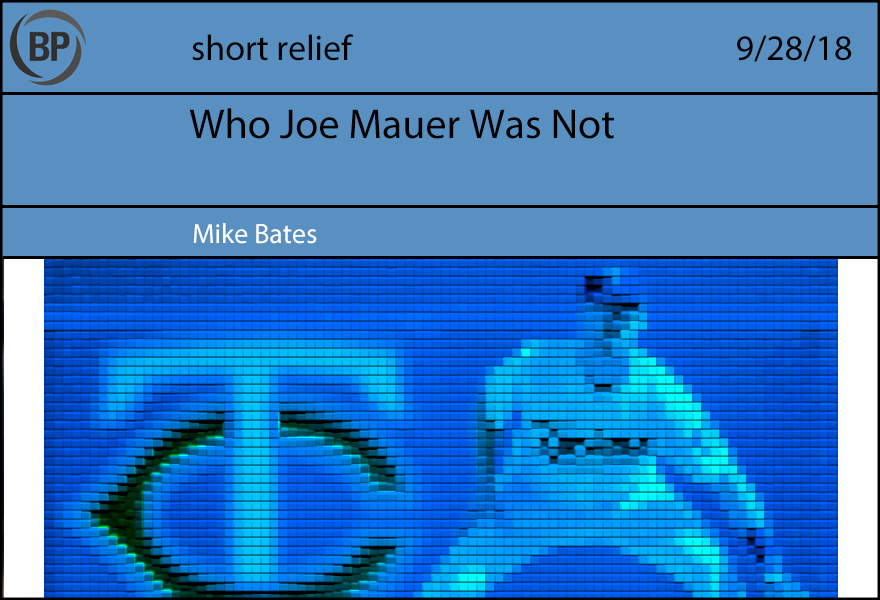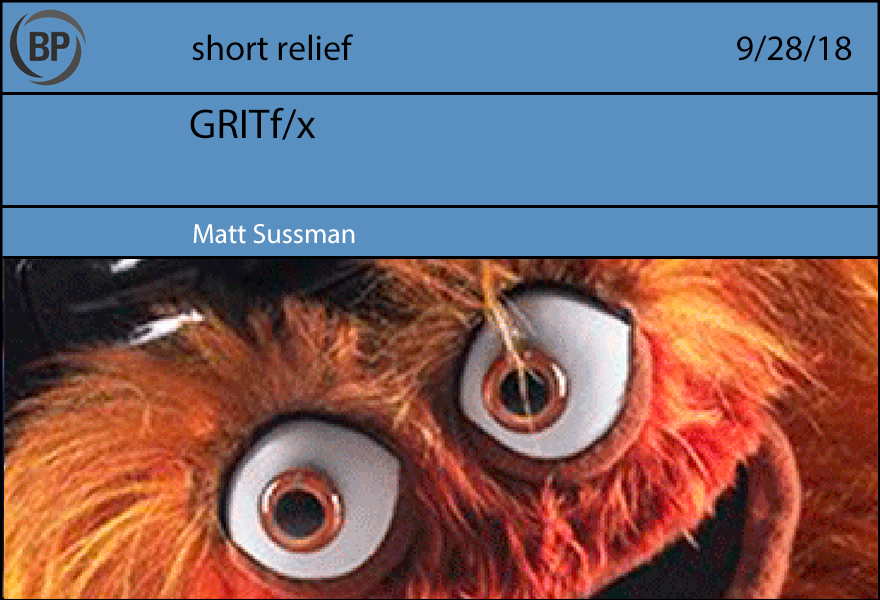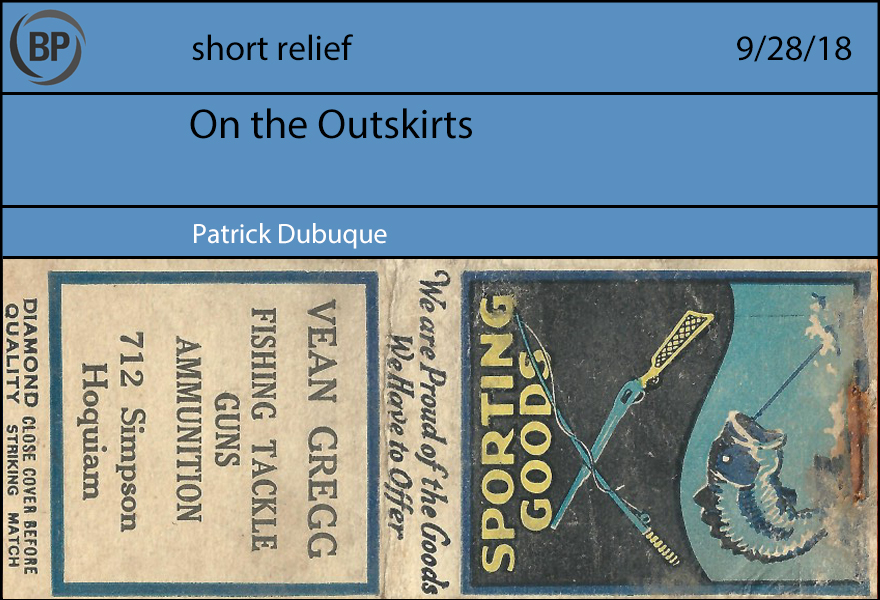
With the end of the Major League Baseball regular season coming on Sunday, this may be my last chance to write about Joe Mauer as an active player (and get paid to do it). As a lifelong Twins fan (who appreciates monetary compensation), I would be a fool not to.
But what is there to say about baseball’s least interesting player? He was a really great catcher for a long time, until head injuries made him a pretty decent first baseman. Now, he’s just acceptable. If he retires, he’ll go out with something like a .306 batting average, more than 125 homers, and more than 2100 hits. He’ll have an MVP award, three Gold Gloves, and five silver sluggers on the wall of his rec room.
But, I mean, that’s it. He didn’t cause controversies. He didn’t make waves. There are fleets of buses under which he never threw a single teammate. He tipped generously and said “please” and “thank you,” and hustled on every ground ball. And he took an eight year, $184 million deal after winning his MVP and couldn’t hit 29 homers every year. For that crime, and for that crime only, some Minnesotans came to hate him.
I don’t pretend to understand those people. Mauer was one of the most valuable players in baseball for six years and was underpaid to do it. Such is the system under which baseball is played. When his time came, he reaped the rewards for his serfdom, again, as is customary. Complaining about that seems like complaining that Winter follows Fall. Dude, we know it does. Every year. Settle down.
Maybe the best way I can think of to describe Joe Mauer, as we look back on his career is to talk about what kind of ballplayer he was not:
He was not a ballplayer like Addison Russell or Jose Reyes, or Roberto Osuna or Aroldis Chapman or Kirby Puckett or any of the other ballplayers who have had domestic violence allegations made against them. Joe Mauer’s personal life was boring. He has a wife and twin daughters. He seems to like them a lot.
He was not a player like Jayson Werth or Matt Bush or Mark Grace or Tony LaRussa. He never got a DUI. I mean, for one thing that would mean that he would have had to drink something stronger than 2% milk, which I refuse to believe he’s ever done. For another, even if he were, I bet Joe was an early adopter of Uber, and then switched to Lyft when supporting Uber became ethically problematic.
He was not a player like Torii Hunter, who started a fight in his own clubhouse. Or a brawl on the field. Joe just seemed to want everybody to be friends.
He was not a player like Barry Bonds or Mark McGwire or Rafael Palmeiro. Not that I’d condemn a player for using PEDs, especially in the climate of the late 1990s and early 2000s, but there has never been any concern that Joe’s accomplishments weren’t his own.
He is a nice man who likes baseball and was very good at it for 15 years.
Other fanbases should be so lucky.

Gritty took the internet by surprise this week, specifically in the manner that baseball somehow went 150 years without a mascot named Gritty and how hockey has claimed the moniker. He’s both goofy and scary, depending on the lighting, and he’s now a Philadelphia institution, just like that broken large bell, that one cheese steak place and that other cheese steak place.
The #pleaselikemysport sport did it. We like it now. But this is a temporary boost because they can’t keep making good expansion teams anymore, for inflation reasons. Baseball is now in a bind. How do they counterpunch the newest mascot and also cater to youths? There’s only one answer, and it’s to ban mascots.
There’s no need for them, at least in baseball. The goofiness is already entrenched in the baseball uniform: rich men wearing silly pants, big socks and a matching hat. They’re not armored up like football or hockey men or wearing appropriate-length bottoms like they do in basketball or soccer. The players are the mascots. They look silly until it’s Randy Johnson’s piercing blue eyes peeking over his outstretched glove, or Gary Sheffield peacocking in the batter’s box. You can never be too careful.
Mascots are meant to offset the seriousness of the athlete, of which there are many in today’s baseball but we are seeing this facade loosen with bullpen dance offs and choreographed dugout viral moments. Hockey obviously needs mascots because no hockey player has ever smiled because of an obvious missing teeth joke that I’ll let your uncle tell.
On the mascot spectrum, there are “good” mascots, such as Orbit and the Phanatic and, well, mostly those two … the rest just score bonus points by hugging children. But the spectrum has no place in the modern baseball game, and it’s time we ban them from participating. I of course do not want to see 20-odd jobs lost, resulting in that many mascots just roaming the streets offering to fire a t-shirt gun in exchange for a hot meal, so I humbly suggest they are all properly relocated to the Mets front office.

There is no 712 Simpson Avenue in Hoquiam, WA. Weary families on the last leg of Highway 109, ready to fly kites on the windswept beaches of Ocean Shores, might fail to notice that there’s a Hoquiam at all; the city is grafted to the more famous town of Aberdeen at Myrtle Street, where a house with a homemade sign offering TV Repair faces a veterinary clinic. Hoquiam has maintained its independence and rivalry with its slightly bigger sibling for more than a century, a cultural conflict only the locals understand. 712 Simpson Avenue would stand a mile west of this demilitarized zone, if it existed, but years ago it was bought and combined with the building next door, 714, and made into a Chinese Restaurant called Golden Dragon. It gets 2.5 stars on Yelp.
For years, 712 Simspon Avenue was the address of an establishment called “The Home Plate,” though the only remaining evidence is trapped in the obituaries of their proprietors. The Home Plate sold sporting goods, ostensibly, though it also offered cigars and a lunch counter, as well as excuses for its owner to spend his days talking. Its founder was a man named Vean Gregg, who settled in the area and then steered his little business through the Depression, standing behind counters most days, then using his own stock to hunt and fish on the others. In his forties he pitched for the local semi-pro city baseball team, the Hoquiam Loggers, until the league quietly disbanded. There was nothing particularly special about Gregg, who lived a predictable, untroubled life. He died at the age of 79 in a convalescent home on the other side of Myrtle, a victim of cancer.
Half a century prior, halfway across the country, Sylveanus Augustus Gregg was, for a moment, one of the greatest pitchers that major league baseball had ever seen. They made up lies to describe his curveball. He won 20 games in each of his first three seasons for the Cleveland Naps, shared dugouts with Cy Young and Babe Ruth. Three seasons to parallel Grover Cleveland Alexander, who made the majors the same year he did. And then, the usual story: arm pain, a few minor comebacks. There’s nothing particularly special about Gregg in that sense, either. If he pitched today, he might be a Hall of Famer.
Gregg debuted in the majors at 26; it wasn’t because of injuries, but because the money in barnstorming tiny Pacific Northwest towns beat the real minor leagues. Twenty years later he traveled those same roads, with nowhere else to go, until he reached the last stop on the line. It’s to his credit, I think, that he found himself in a town named after the driftwood that washes into the harbor, and found that it suited him.
Thank you for reading
This is a free article. If you enjoyed it, consider subscribing to Baseball Prospectus. Subscriptions support ongoing public baseball research and analysis in an increasingly proprietary environment.
Subscribe now